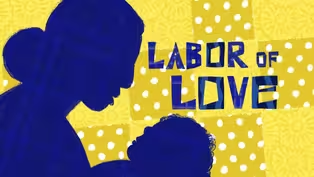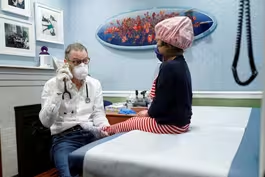
How vaccine hesitancy is playing into rising measles rates
Clip: 2/25/2024 | 5m 17sVideo has Closed Captions
How vaccine hesitancy is contributing to rising rates of measles and COVID
Vaccines have been proven to be an effective weapon against many diseases. Measles, for instance, was declared eliminated from the U.S. in 2000, and more recently, vaccines helped curb the spread of COVID. But both of those diseases are on the rise in 2024. PBS NewsHour digital health reporter Laura Santhanam joins John Yang to discuss why cases are climbing.
Problems playing video? | Closed Captioning Feedback
Problems playing video? | Closed Captioning Feedback
Major corporate funding for the PBS News Hour is provided by BDO, BNSF, Consumer Cellular, American Cruise Lines, and Raymond James. Funding for the PBS NewsHour Weekend is provided by...

How vaccine hesitancy is playing into rising measles rates
Clip: 2/25/2024 | 5m 17sVideo has Closed Captions
Vaccines have been proven to be an effective weapon against many diseases. Measles, for instance, was declared eliminated from the U.S. in 2000, and more recently, vaccines helped curb the spread of COVID. But both of those diseases are on the rise in 2024. PBS NewsHour digital health reporter Laura Santhanam joins John Yang to discuss why cases are climbing.
Problems playing video? | Closed Captioning Feedback
How to Watch PBS News Hour
PBS News Hour is available to stream on pbs.org and the free PBS App, available on iPhone, Apple TV, Android TV, Android smartphones, Amazon Fire TV, Amazon Fire Tablet, Roku, Samsung Smart TV, and Vizio.
Providing Support for PBS.org
Learn Moreabout PBS online sponsorshipJOHN YANG: Vaccines have proven to be an effective weapon against many diseases.
Measles, for instance, was declared eliminated from the United States in 2000.
And more recently, vaccines have helped curb the spread of COVID.
But this year, both of those diseases are on the rise.
The Centers for Disease Control and Prevention says there's already been 35 cases of measles so far this year, compared with 58, and all of 2023.
NewsHour digital health reporter Laura Santhanam has been looking into this.
Laura, let's take the case of measles, there is an effective there has been an effective measles vaccine for decades.
Why are cases climbing?
LAURA SANTHANAM: You know, it kind of boils down to an answer that an epidemiologist gave me recently, which is a vaccine is nothing if it's not administered.
And that's what we're seeing right now.
The pandemic and misinformation have combined to sort of really see this decline in vaccines for both of these infectious diseases, thinking about, you know, just sort of the chaos that the pandemic gave us.
You know, a lot of people weren't getting, you know, check scheduled childhood vaccines for their kids, people were afraid to sit in waiting rooms, exam rooms, and, you know, we saw that and we're still sort of working our way out of that.
And then thinking about the role that misinformation has played in sort of undermining people's confidence in that we're still dealing with that mess.
JOHN YANG: Some vaccines have been with us for generations.
But looking back in history, looking at when they were first introduced, was there the same sort of misinformation then?
Or is that something a new phenomenon?
LAURA SANTHANAM: It's kind of wild to think, you know, infectious diseases have been something that humanity has been dealing with since before we were able to record history, right.
And some of these diseases are, you know, we're just kind of starting to wrap our arms around.
Take polio, for example.
The ancient Egyptians were dealing with polio, right, and it wasn't until late the 1950s.
Dr. Jonas Salk started to deploy a vaccine starting in a school in Pittsburgh, and in that campaign went around the country around the globe.
And generations later, medical school students are more likely to learn about polio in history books, and then they are in clinic here in the US.
And that's because of that work.
It didn't just go away because we wished it away.
It went away because of these vaccine campaigns.
JOHN YANG: How did all the disinformation that spread and the mistrust that spread around the COVID vaccine?
How has that affected other vaccines?
LAURA SANTHANAM: You know, we've been dealing with misinformation for quite some time when it comes to vaccines.
You know, it starting in in the late 1990s, with thinking about the measles, mumps rubella vaccine, and to this day, there are still people who, you know, withhold that vaccine from their children, because they think it might cause problems that just evidence studies conducted over so many years in so many countries.
Just it they continue to debunk that since retracted study.
But that sort of laid the groundwork for some of the misinformation campaigns we're seeing about COVID vaccine now, whether it's talking about how quickly it was deployed, and then, you know, when politics are getting involved in some of those campaigns, it makes it a message disentangle.
Time and again, when I've been talking to clinicians about this, they recommend that people ask their doctors, if you have questions about the COVID vaccine, measles vaccine, any of these vaccines that are recommended that are approved and vetted by the CDC, by the FDA, you know, have those conversations with your doctors.
But also, you know, perhaps equally importantly, doctors should be ready to have those conversations with their patients.
I had a conversation with a doctor in South Alabama who was saying, you know, physicians should be welcoming these conversations.
They should be ready to answer questions, and shouldn't discourage patients from having them in the first place.
Vaccine misinformation expert also told me that people are going to misinformation for a number of reasons.
But some of those reasons is because they weren't able to get answers when they needed them from their health care providers in the first place.
So it just be ready to have these conversations and welcome them.
JOHN YANG: One of the fears that you've heard from doctors and public health officials about this, but about diseases that we thought we had conquered but have been wiped out like measles.
LAURA SANTHANAM: In the U.S. we've seen vaccination rates among kindergarteners declined to 93 percent.
It's supposed to be 95 percent.
Right.
That's the recommended threshold to prevent community transmission and a lot of suffering and harm.
Two percentage points may not sound like a lot, but according to the CDC, that roughly translates to 250,000 kids who are left at higher risk for developing measles.
They could become deaf as a result develop encephalitis and in most tragic cases, die.
Physicians pediatricians, especially who I've talked to, in my reporting, are very concerned that will give a foothold to these diseases that we had worked so hard to contain that will give an opportunity for preventable death to rise in this country.
JOHN YANG: Laura Santhanam, our digital health reporter, thank you very much.
LAURA SANTHANAM: Thank you.
JOHN YANG: And you can read more of Laura's reporting on the rise in measles cases and the misinformation around the measles vaccine at pbs.org/newshour.
A look at what might be the brightest object in the universe
Video has Closed Captions
Clip: 2/25/2024 | 1m 9s | A mind-boggling look at what might be the brightest object in the universe (1m 9s)
The story of Granny Hayden, a Black midwife and former slave
Video has Closed Captions
Clip: 2/25/2024 | 3m 5s | The story of Granny Hayden, a Black midwife who was born into slavery (3m 5s)
What a federal lawsuit means for kids health care in Florida
Video has Closed Captions
Clip: 2/25/2024 | 8m 20s | What a federal lawsuit filed by Florida means for low-income children’s health care (8m 20s)
Providing Support for PBS.org
Learn Moreabout PBS online sponsorship
- News and Public Affairs

FRONTLINE is investigative journalism that questions, explains and changes our world.

- News and Public Affairs

Amanpour and Company features conversations with leaders and decision makers.












Support for PBS provided by:
Major corporate funding for the PBS News Hour is provided by BDO, BNSF, Consumer Cellular, American Cruise Lines, and Raymond James. Funding for the PBS NewsHour Weekend is provided by...


